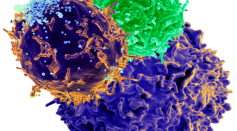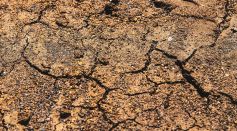ENVIRONMENT & CLIMATE
Cage of Cages: New Type of Porous Material Shows Potential in Trapping Carbon Dioxide and More Potent Greenhouse Gasses

Greetings of Poop? African Elephants Found To Use Feces To Say Hello to Each Other
Giant Crystal Cave in Mexico: A Chamber Where Gypsum Grows Six Times the Size of a Human

Tourist Traffic Could Be Driving Algal Bloom Growth in Lake Windermere, Causing the Waters To Turn Green, Researchers Claim

Case Closed? 2,700-Year-Old Mystery of Temple Symbols in Ancient City Could Have Been Solved by Historian

Rare Wooden Structure From Bronze Age Discovered by Archaeologists in Well-Preserved Condition

Prehistoric Pandemic: How Did ERV-FC Infect Mammals for 15 Million Years?
Extremely Rare Tornado Spinning in Opposite Direction Hits Oklahoma; What Causes Anticyclonic Windstorms?
2,500-Year-Old Illyrian Helmet Excavated in a Burial Site in Croatia Could Be Votive Offering or Part of Cult Practice

Prey Playing Dead? Dice Snake Fakes Death Using Bloody, Gory Tactics To Avoid Getting Eaten by Predators, Study Reveals

Activated in Fault Zone in Texas Could Yield Heightened Seismic Activity, More Earthquakes [STUDY]

Alexander the Great's Bathroom From 2,300 Years Ago Where Young Ruler Could Have Bathed With Companion Discovered by Archaeologists in Royal City of Aigai
Why Do Most Mammals Have 5 Fingers? Exploring the Homology of Living Tetrapods
12-Sided Roman Object Found in Lincolnshire Baffles Researchers; Strange Archaeological Object’s Purpose Remains a Mystery
Most Popular

7 Breakthrough Medical Technologies Revolutionizing Healthcare in 2026

What Is a Galaxy—and How Many Are There in the Universe?

How Exercise Mental Health Works: The Science Behind Physical Activity and Mood

Black Hole Time Dilation: How Extreme Gravity Bends Time, Light, and Reality





